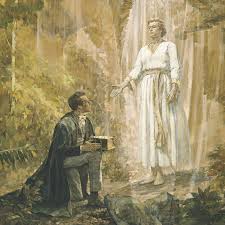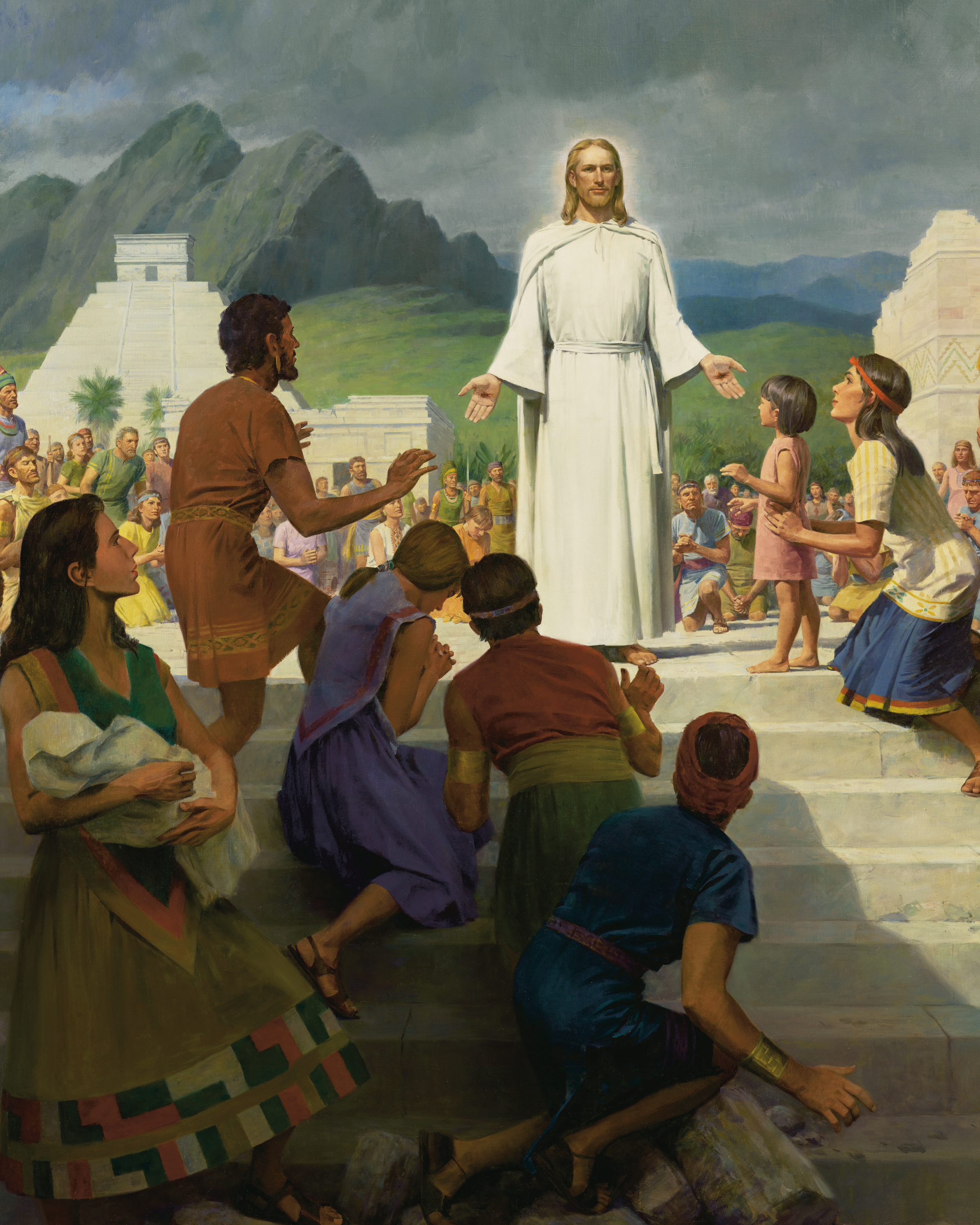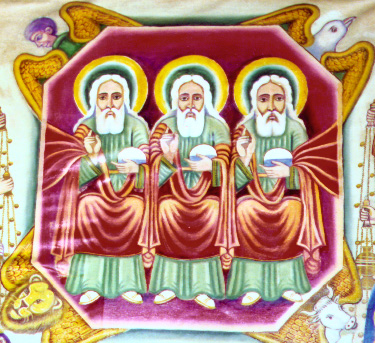By Extra-Protestant I mean groups that most Protestants don’t claim, but because they sprang out of Protestantism I think they belong in this series.
If there are mistakes in what follows (and in some cases I sincerely hope there are) will somebody please correct them in the Comments below. I am not intending to make light of the teachings of these folks, but I think I should comment on the more un-Orthodox doctrines, some of which seem to me to be “off the wall”, as they say. But to re-repeat what my professor said, “Many people are better than their theology”, so please remember that in all these groups there are many good and sincere people.
Unitarianism
This is the easy one.
Though there were Unitarians and Unitarian congregations before this in Europe and England, they first organized as a denomination in the 1700s in America. They were so called because they believed in God but not in the Holy Trinity. Today even belief in God, or at least in a personal God, seems to be optional. I once had lunch with a local Unitarian pastor who told me he prayed. I responded, “I wondered what you did in church if you didn’t pray.” He said, “Oh, by myself, not in church! Once I prayed in church, and a group from the congregation came to me and said, ‘Don’t ever do that again.'”
The original Unitarian ideal was to believe in the religion “of Jesus”, not the religion “about Jesus”. (How to separate them is  problematic, because the Jesus who taught good things also claimed to be Messiah and said he had all authority in heaven and earth.) Unitarians draw on many religious traditions – except, I think, for traditional Christianity. They support many good social causes. We Orthodox almost agree with the slogan above. Though we insist on the Creed, Christianity is not primarily a set of doctrines but rather The Way, a way of living – “good deeds”.
problematic, because the Jesus who taught good things also claimed to be Messiah and said he had all authority in heaven and earth.) Unitarians draw on many religious traditions – except, I think, for traditional Christianity. They support many good social causes. We Orthodox almost agree with the slogan above. Though we insist on the Creed, Christianity is not primarily a set of doctrines but rather The Way, a way of living – “good deeds”.
In 1961 the Unitarians merged with a Universalist group and are now called the Unitarian-Univeralist Association. Universalists originally believed in universal salvation, but now believe simply in seeking for truth everywhere – except you know where.
There are about about 800,000 Unitarian-Universalists today, of whom 200,000 are in the U.S.
Mormonism
…so called because of their origins in the Book of Mormon, but they are properly called the Church of Jesus Christ of Latter Day Saints and often label themselve simply LDS.
I have no idea how to get hold of this one. The more I read the less sure I am. If any of you know more about the LDS than I do, I’d be very grateful if you would chime in.
This is for certain: Mormonism originated in the 1820s in upstate New  York when one Joseph Smith claimed he had a visit from the Angel Moroni (an otherwise unknown angel) who brought him some golden tablets or plates on which was written in Middle Hebrew (an otherwise unknown language) the Book of Mormon. But then how could he translate it? If what I read is accurate, he used a “seer stone” – which suggests esoteric religion – and thus put the book into (oddly enough) Elizabethan English. The book of Mormon told the story of the Nephites (an otherwise unknown people) in Central or South America from 2700 BC to 420 AD. It says that Christ soon after his
York when one Joseph Smith claimed he had a visit from the Angel Moroni (an otherwise unknown angel) who brought him some golden tablets or plates on which was written in Middle Hebrew (an otherwise unknown language) the Book of Mormon. But then how could he translate it? If what I read is accurate, he used a “seer stone” – which suggests esoteric religion – and thus put the book into (oddly enough) Elizabethan English. The book of Mormon told the story of the Nephites (an otherwise unknown people) in Central or South America from 2700 BC to 420 AD. It says that Christ soon after his  Ascension, knowing the Apostles would mess it up, visited America and revealed the true faith to the Nephites.
Ascension, knowing the Apostles would mess it up, visited America and revealed the true faith to the Nephites.
What happened to the golden plates? Smith said they were taken away by the angel Moroni. Did anybody else see the plates? He wrote first that the angel forbade this. Then later, when their authenticity was questioned, Smith obtained testimony from 4 or 7 or 11 men that they had seen them, but it’s unclear whether they saw them materially or in a vision.
This sounds rather like Mohammed’s account of his private visit from the Archangel Gabriel and the origins of Islam, does it not? – as opposed to the Revelation in Jesus Christ which was witnessed not only by the 12 Apostles but by many others who confirmed its authenticity.
Mormon Teachings
For Mormons the Book of Mormon has the same authority as the Christian Bible.
After that things get a bit murky.
Every website I checked gave somewhat different accounts. Perhaps this is because Mormon teachings change from time to time according to new revelations given to the current “Prophet, Seer, Revelatory and President” of the LDS. It seems sort of like Popes speaking infallibiy, but saying contradictory things at different times. For example, the Book of Mormon clearly allows polygamy. Below: a very busy early Mormon husband and family. Because of it,  Latter Day Saints were driven out of New York, Ohio, Illinois and Missouri (where Joseph Smith was murdered and Brigham Young took over) and settled in Utah. But in 1890 a new revelation from God to a Mormon leader forbade polygamy, though it is still practiced in a few Utah villages. The Book of Mormon states clearly that white people are superior to blacks, who were not allowed to take part in temple ceremonies. Then in 1978 a new revelation declared that African-Americans are equal to whites.
Latter Day Saints were driven out of New York, Ohio, Illinois and Missouri (where Joseph Smith was murdered and Brigham Young took over) and settled in Utah. But in 1890 a new revelation from God to a Mormon leader forbade polygamy, though it is still practiced in a few Utah villages. The Book of Mormon states clearly that white people are superior to blacks, who were not allowed to take part in temple ceremonies. Then in 1978 a new revelation declared that African-Americans are equal to whites.
As near as I can tell but I wouldn’t bet the farm on this, Mormon theology says that men and women had a pre-existence or pre-earthly life in which we were children of unnamed spiritual heavenly parents. God created us so that we might be made divine. However, Smith taught that God the Father and Jesus (sometimes called Jehovah) and the Holy Spirit (all 3 of whom have physical bodies)  did not begin as divine but preceded us through our progression on earth. Smith said God the Father “once was a man like one of us and … once dwelled on an earth the same as Jesus Christ himself did in the flesh and like us.” But the makes God the Father into a lesser god – so who then is the real God behind it all? LDS Church leader Lorenzo Snow summed it up: “As man now is, God once was. As God now is, man may be.” Orthodox almost accept the last part of that, since the Apostle John wrote that “We will be like him”, Jesus Christ. We call it Theosis. In Mormon teaching, Father, Son and Holy Spirit, now that they have become gods, have been given their own planets. As will we all.
did not begin as divine but preceded us through our progression on earth. Smith said God the Father “once was a man like one of us and … once dwelled on an earth the same as Jesus Christ himself did in the flesh and like us.” But the makes God the Father into a lesser god – so who then is the real God behind it all? LDS Church leader Lorenzo Snow summed it up: “As man now is, God once was. As God now is, man may be.” Orthodox almost accept the last part of that, since the Apostle John wrote that “We will be like him”, Jesus Christ. We call it Theosis. In Mormon teaching, Father, Son and Holy Spirit, now that they have become gods, have been given their own planets. As will we all.
And there’s more. Look it up for yourself – again using Wikipedia which gives many sources: https://en.wikipedia.org/wiki/Book_of_Mormon#Jesus
I hope I’ve got this wrong. But if the preceding is accurate, I think an Orthodox analysis of Mormon theology should begin with the word, “W H A A T ?!” There are so many false teachings here I can’t imagine how to start.
But that isn’t necessarily what Mormons believe now! If you go to today’s LDS websites, you’d never guess these things. Their statements make Mormonism sound more like Evangelical Christianity: https://www.mormonnewsroom.org/article/what-mormons-believe-about-jesus-christ
But some sources say there is now a move in Mormonism to return to earlier doctrines. I give up. However, ask different Anglicans at different times what Anglicanism is all about, and you will get very different answers, so the Mormons aren’t alone in their theological variegation.
There is some consistency to how Mormons behave. Mormons do not smoke or drink alcohol. Only Mormons may enter the temple,  wherein are secret ceremonies which are not supposed to be revealed. Those who are enrolled as priests (not what we mean by priests) wear special
wherein are secret ceremonies which are not supposed to be revealed. Those who are enrolled as priests (not what we mean by priests) wear special  underwear called “temple garments” (don’t ask…), and if you’re in Salt Lake City in the summertime it’s fun to look for them.
underwear called “temple garments” (don’t ask…), and if you’re in Salt Lake City in the summertime it’s fun to look for them.
Above: Salt Lake Temple
Mormons baptize non-believers in absentia and also the dead, based on I Corinthians 15:29, an obscure passage which the Church has ignored. Mormons keep geneaological records of a vast number of people, stored in a huge vault dug in Granite Mountain east of Salt Lake City. Since we Olnhausens had a distant Mormon relative, I’m pretty sure I’ve now been baptized Mormon. (Don’t tell my bishop…)
How do thinking people deal with all this? I don’t know but my guess is they ignore a lot of it – the same way liberal Protestants deal with their denomination’s official teachings. I’ve known more than a few modern Mainline Protestants who recite the Creed but believe very little of it.
Mormonism today
 2 pleasant young women once came to our door (that’s not me) hoping to make us Mormons. I said, ” I will listen to you if you will let me ask you 2 questions.” I listed some of the things about Mormonism which I just shared with you. Then I asked nicely (I was not out to embarrass them), “Do you believe these things. They said, “Yes, we do.” I asked, again not rudely because I really wanted to know, “Why do you believe these things?” They said, “We just do.” I responded, “But please give me a reason.” They turned and left. They were so sweet and sincere that afterwards I almost wished I hadn’t done it.
2 pleasant young women once came to our door (that’s not me) hoping to make us Mormons. I said, ” I will listen to you if you will let me ask you 2 questions.” I listed some of the things about Mormonism which I just shared with you. Then I asked nicely (I was not out to embarrass them), “Do you believe these things. They said, “Yes, we do.” I asked, again not rudely because I really wanted to know, “Why do you believe these things?” They said, “We just do.” I responded, “But please give me a reason.” They turned and left. They were so sweet and sincere that afterwards I almost wished I hadn’t done it.
The result of all this peculiar teaching? Mormonism is one of the fastest growing religions in the world! with about 15 million members including about 4.5 million in the U.S.
Now let’s come at it from another angle. From the beginning, by necessity, Mormons have been a united in-grown group. They have close fellowship, good education, strong families and social groups. They care for each other. They almost all tithe 10% to the church and worship weekly. They have little crime. And if I’ve been told right, there is a lot of social pressure to conform. Each year over 50,000 well-trained “wholesome” young Mormon missionaries (paying their own expenses) go out into the U.S. and abroad to win converts – men on 2 year terms, women 18 months. The material they hand out is well done and convincing, if you don’t know any better.
To repeat: “The results of all this…? Mormonism is one of the fastest growing religions in the world.”
Next Week: I had really hoped to conclude this series on Other Faiths this week, but as usual I’ve gone on too long. So next week we’ll cover Jehovah’s Witnesses and Christian Scientists and talk about How to live as Orthodox in a non-Orthodox society. And then we will finally be done!
Week after Next: back at last to things more Orthodox. The Falling Asleep of the Theotokos and Weeping Icons.
In New Zealand some young American missionaries on bicycles came up to me and told me that there is a New Prophet! He superceded Jesus who is also a prophet .
I wondered if this were a new departure for Mormons?
However I begged the young men not to approach Moslems in the neighbourhood because, I said, Islam claimed that Mohammed was the last Prophet and they may feel insulted and become violent in defence of their faith. I don’t think this advice penetrated. They had fixed smiles on their faces as they rode off.
If they weren’t Mormons what were they?
I can’t imagine Mormons saying that Joseph Smith “superceded” Jesus. On the other hand their technique sounds Mormonish.
I went into an old Unitarian church in Charleston, SC, that was also a city landmark. Wonderful architecture and decoration. Not the barebones, New England kind of thing I was expecting. I asked the woman showing people around something like, “So,…what exactly do you do? What’s the point of showing up on Sunday instead of sleeping in and watching football?” It seemed really odd to me to build such a beautiful building if it didn’t really matter whether “parishoners” even attended. I guess that was a time when Unitarianism was still a “legitimate” Christian heresy. Now, I guess it’s divorced from any particular theological tradition and is more or less a social club. May as well be a Mason. I have no idea what they do in those lodges, but if it involves liquor and cigars, it sounds a sight better than getting up on Sunday morning to hear, “I’m okay, you’re okay, we’re all okay.” Oh, that brings up a thought. Have you addressed Freemasonry in the context of this thread? Is it a religion? A mystery cult? An odd fraternity?
I don’t think Unitarianism is just a social club. They would say that the world is not okay, and they believe in working to improve that. Freemasons? Their origins go back before Protestantism. Their ceremonies are supposed to be entirely secret, so I don’t trust much of what is written. If their ceremonies are as elaborate as they say, they seem to provide, for Protestants, a substitute for the traditional ceremonies of the Mass. However, I don’t think I want to go there.
I have read sources that claim that J Smith borrowed extensively from Freemasonry for his secret temple ceremonies. However, as I am neither Mormon nor a Freemason, I cannot independently corroborate that claim. It is true that freemasonry was very popular in New York when Smith was getting started though. As a young woman I did a lot of research on Mormonism because I live in a very Mormon area and had lots of Mormon friends. I read all kinds of things, but approaching it from the sensational side (e.g. “why the underwear!?”) is generally unhelpful. Mormons want some kind of apostolic continuity and I think it’s really exciting that the Orthodox Church can answer that, in a way Protestant churches can’t.
I’ve heard about the Mason connection but think it’s too shaky to comment on. Regarding the underwear, I forgot to set the intended image for the Blog and was not pleased when whichever demon works inside the Blog website set the image of the Mormon underwear for all to see! This comes from the rush of getting the Blog out before going on vacation. Sorry. I’ll go back and try to change it.
So in a way, your post got caught with its pants down.